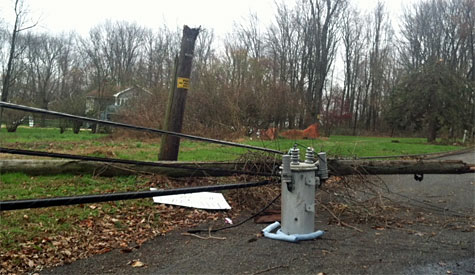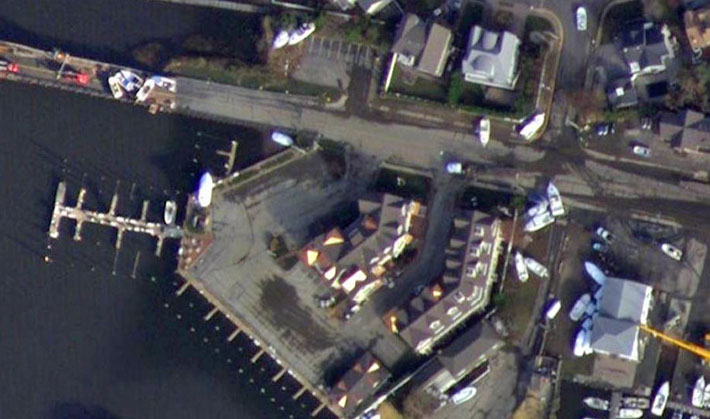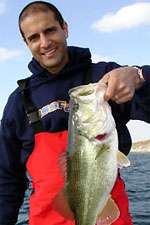
It was only a week ago that Hurricane Sandy bashed through New Jersey and parts of New York, Connecticut and a few other states, bringing devastation on a scale new to the Northeast. Now a Nor’easter is bearing down on the same states with frigid temperatures and snow, while some people and businesses are still trying to deal with basic needs like shelter, food and the all-important electrical power.
The coastal saltwater fisheries that are normally in full-swing right now – for striped bass and blackfish – are, amazingly enough, done. Finished. Coastal tackle stores are almost completely decimated, as are the marinas, boat ramps, boats and beaches they depend on.
“It’s devastated here,” said Pete Crosta, owner of Atlantic Highlands Bait and Tackle in Atlantic Highlands, N.J. He’s one of the literal few shops open for business and with a working phone line, and typically is busy dawn to dusk this time of year. But now, he said, “There’s nothing I can say. We’re done ’til June, we’re out of business.”
Inland, however, it’s not as bad. “Once you get off the coast, freshwater fishing is pretty much unaffected other than power and access issues,” said Jim Sciacia, spokesman for the New Jersey Division of Fish and Wildlife. “But a lot of power has been restored, and inland access probably is not a problem.”
Finding the time and enough rationed gas to get out on the water is another story, however. Take Tom Presnell, marketing director for the New York B.A.S.S. Federation Nation. His club canceled a post-Sandy tournament on Connecticut’s Candlewood Lake because of gas concerns.
“We decided to cancel because basically we didn’t think it would be good to get in line [with boats] at the gas pumps – we were worried about our personal safety,” he said. He was referring to the fact that long lines for gas and gas stations running out of gas while people are in line have brought out the worst in some people.
 Presnell also had a tournament canceled before Sandy even arrived. Several lakes and rivers in New York and New Jersey were dropped in anticipation of high flood waters, which never arrived but did and will affect fishing.
Presnell also had a tournament canceled before Sandy even arrived. Several lakes and rivers in New York and New Jersey were dropped in anticipation of high flood waters, which never arrived but did and will affect fishing.
New York’s Mohawk River, for example, was dropped three to five feet below navigation levels. “They closed the locks indefinitely, and also lowered the water level to where it was actually dangerous to run anything but small outboards,” Presnell said. “Basically you have a lot of canceled tournaments up in the New York area.”
More than a week after Sandy, Presnell was still without electricity and had to siphon gas out of his boat to use in a portable generator. He said: “I was trying to be resourceful, depleting the gas in my boat, but unfortunately I put expensive fuel stabilizer in my boat so that generator got some nice stabilizer going through it!”
 New Jersey Federation president John Radamski said his state’s tournaments were already done and “everyone seems to be okay. We might have lost a house or two along the way, but other than that no one’s called me to tell me anything’s bad.”
New Jersey Federation president John Radamski said his state’s tournaments were already done and “everyone seems to be okay. We might have lost a house or two along the way, but other than that no one’s called me to tell me anything’s bad.”
If he sounds casual about it, he also said this: “I’ve lived in New Jersey all my life, and this is the absolute worst I’ve ever seen it. I think it put a bug in the back of people’s heads that you’re never as prepared as think you are.”
Bassmaster Classic qualifier and fellow New Jerseyan Pete Gluszek feels the same way. “I was as prepared as I could be, but I’m wondering why I didn’t evacuate, honestly,” he said. “I feel very fortunate. A lot of people close to me are still without electricity, and there’s devastation and complete loss down at the shore.
“That’s what my main focus and concern is right now – reaching out and helping those around me who are going to be struggling the rest of this year. I’m going to do the best I can do personally, and hopefully get some help from Bass University contacts and friends to help with some donations.”
Connecticut Federation president Sylvia Morris also didn’t have to cancel any tournaments and hadn’t heard any stories of her members being severely affected by the storm.
She lives in Milford, Conn., which is on the north shore of Long Island Sound, and amazingly got no major damage – unlike some of her neighbors.
The owner of New Jersey’s biggest bass bait company, MegaStrike Fishing Products, wasn’t so lucky. Bobby Uhrig lives and works in Freehold, which was devastated by floods caused by Hurricane Irene last year, and got hammered with Sandy’s winds this year.
“We were up and running, trying to fulfill orders for everybody, and all of a sudden this storm comes,” he said. “It’s total devastation here. It looks like a nuclear bomb hit. No power, no gas, no electric, no hot water, two-mile-long lines for gasoline. So the last thing on anybody’s mind around here is fishing – or even getting back to work because their houses and lives are in shambles.”
In terms of his facility, he said: “We didn’t really get [much damage], but our computers and everything electric – like our filling machines and molding machines – were shut down for seven days.”
Even if he could fulfill orders during that time, “a lot of [retail] business in New Jersey and New York are done. They’re crushed, orders are canceled.”
Even so, Uhrig said he feels fortunate and has been truly blown away by the support he and his company have gotten. “I can’t tell you how many emails and calls I’ve gotten, people asking, ‘Bobby are you alright. We’ll do whatever we need to do to get you back up and running.’
“The outpouring of help was phenomenal. Fishermen from all over the country who use our products are asking if we’re okay. I even had these guys from Long Island who said, ‘We will come to your house, we’ll do whatever it takes, remove trees, whatever, if you need it.'”
Uhrig gets fired up when he talks about that support. “We’re America, we’re New Jersey, we’re resilient – we’ll do whatever it takes to help our neighbors. The most important thing was helping our families and neighbors clean up. There’s so much devastation here, you can’t wait for a cleanup crew or tree service to come. So what you do is get your hands dirty and do it.”
MegaStrike is now back up and running, and Uhrig said he received a bunch of orders from European customers explicitly to help kick-start his business. “It was tough, but we’re getting orders out right now,” he said.

